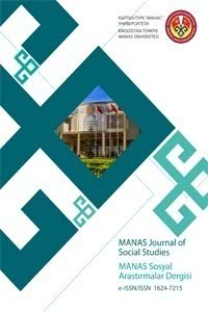Kutadgu Bilig’de Din ve Devlet İlişkisi: İki Dünyada Da Mutlu Olmak
Kutadgu Bilig hakkında yapılan çalışmalara eleştirel bir giriş yapan makale, Orta Asya, Türk ve İslam toplumlarının geleceği için önemli konulardan biri olan din ve devlet arasındaki ilişki hakkında Kutadgu Bilig‟in politik teorisini ortaya koymaktadır. Din ve devlet ilişkisinin incelenmesi, aslında bu konunun gündemden düşürülmesi ve geleceğin önünün açılması için gereklidir. Uygarlığımız için bir rehber niteliğinde olan Kutadgu Bilig‟de devlet ve din otonom alanlar olarak karşımıza çıkar; birbirlerini kontrol altına almazlar. Din ve devlet ile bunların fiziksel yansıması olan din adamı ve devlet adamı birbirinden güç ve destek almalıdır; fakat tek bir vücut haline gelmemelidir. Dinin saflığını koruması ve devletin görevlerini yerine getirebilmesi için bu önemlidir. Bu politik teorisini açıklarken Yusuf Hacib iki etik yaklaşım tanımlar: din adamı etiği ve devlet adamı etiği. Hem din adamı hem de devlet adamı için fiziksel ve tinsel dünyalar gerçektir ve iki dünyada da mutlu olmaları mümkündür, yeter ki benimsedikleri yaşamın ve mesleğin gereğini yapsınlar
Anahtar Kelimeler:
Kutadgu Bilig, Yusuf Has Hacib, din adamı etiği, devlet adamı etiği, Orta
THE RELATIONSHIP BETWEEN RELIGION AND STATE IN KUTADGU BILIG: TO BE HAPPY IN BOTH WORLDS
The article makes a critical introduction to the studies on Kutadgu Bilig and puts forward its political theory on the relationship between religion and state, which is one of the critical issues for Central-Asian, Turkic, and Islamic nations. Analyzing the relationship between religion and state is necessary toward having this issue not to further consume the energy of these nations and therefore opening up the future. Kutadgu Bilig, which is a politic-theoretical and philosophical treasure, approaches to religion and state as two autonomous realms - the realms that one must not control the other. Although religion and state can support each other whenever necessary, they should not merge so as to create a theocratic government. This is necessary for both religion to keep its innocence and the state its functionality. Yusuf Has Hacib, toward explaining this political theory, defines two distinct ethical approaches: the ethics of statesman and the ethics of pious man. For both statesman and pious man, not only the physical world and the other (spiritual) world are real, but it is possible to be happy in both worlds, provided that they sincerely do what their social positions and vocations require them to do
___
- Arat, R. R. (1970). “Kutadgu Bilig ve Türklük Bilgisi”. Türk Kültürü, 98: 70-90.
- Arsal, S. M. (1947). Türk Tarihi ve Hukuk. İstanbul: İstanbul Üniversitesi Hukuk Fakültesi.
- Arslan, M. (1987). Kutadgu Bilig‟deki Toplum ve Devlet Anlayışı. İstanbul: İstanbul Üniversitesi Edebiyat Fakültesi.
- Çağatay, S. (1970). “Kutadgu Bilig‟de Öğdülmiş”. Türk Kültürü, 98: 95-111.
- Dankoff, R. (1983). Wisdom of Royal Glory: A Turko-Islamic Mirror for Princes. Chicago: The University of Chicago Press.
- Devereux, R. (1961). “Yusuf Khass Hajib and The Kutadgu Bilig”. Muslim World, 51: 299-310.
- Dilaçar, A. (1995). Kutadgu Bilig İncelemesi. Ankara: Türk Dil Kurumu, 3.Basım.
- Doğan, N. (2002). “Kutadgu Bilig‟in Devlet Felsefesi-I”. Erciyes Üniversitesi, Sosyal Bilimler Enstitüsü Dergisi, 12: 127-158.
- Dundich, A. (2013). “The Heartland Today: Cooperation and Struggle for Power.” Nick Megoran and Sevara Sharapova (Eds.), Central Asia in International Relations: The Legacies of Halford Mackinder. New York. Columbia University Press: 223-243.
- Findley, C. V. (2005). The Turks in World History. New York: Oxford University Press.
- Golden, Peter B. (2011). Central Asia in World History. New York: Oxford University Press.
- Hacib, Yusuf Has (1988). Kutadgu Bilig. Çev. Reşid Rahmeti Arat, 4. baskı. Ankara: Türk Tarih Kurumu.
- Huntington, S. P. (2003). The Clash of Civilizations and the Remaking of World Order. New York: Simon & Schuster.
- Huntington, S. P. (1993). “The Clash of Civilizations?” Foreign Affairs, 72/3: 22-49.
- İnalcık, H. (1966). “Kutadgu Bilig‟de Türk ve İran Siyaset Nazariye ve Gelenekleri.” Reşid Rahmeti Arat İçin. Ankara: Türk Kültürünü Araştırma Enstitüsü: 259-271.
- İnan, A. (1970). “Yusuf Has Hacib ve Eseri Kutadgu Bilig Üzerine Notlar”. Türk Kültürü, 98: 112-126.
- Kafesoğlu, İ. (1980). Kutadgu Bilig ve Kültür Tarihimizdeki Yeri. İstanbul: Kültür Bakanlığı.
- Karamanlıoğlu, A. F. (1970). “Kutadgu Bilig‟in Diline ve Adına Dair”. Türk Kültürü, 98: 127-131.
- Köprülü, M. F. (1981). Türk Edebiyatı Tarihi. İstanbul: Ötüken, 3. Basım.
- Kuran-ı Kerim ve Açıklamalı Meali (1993). Ankara: Türkiye Diyanet Vakfı.
- Megoran, N. and S. Sharapova (Eds.) (2013). Central Asia in International Relations: The Legacies of Halford Mackinder. New York. Columbia University Press.
- Niyazi, M. (1993). Türk Devlet Felsefesi. İstanbul: Ötüken.
- Sardar, Z. (1999). “The Problem of Futures Studies”. Ziauddin Sardar (Ed.), Rescuing All Our Futures: The Future of Futures Studies. Westport, Connecticut: Praeger: 9-18.
- Shah, I. (1978). Learning How to Learn: Psychology and Spirituality in the Sufi Way. San Francisco: Harper & Row Publishers.
- Walzer, M. (1973). “Political Action: The Problem of Dirty Hands”. Philosophy and Public Affairs, 2/2: 160- 180.
- www.tdk.gov.tr (2015). Türk Dil Kurumu, Dîvân-u Lugâti‟t-Türk Veri Tabanı.
- ISSN: 1694-7215
- Yayın Aralığı: Yılda 4 Sayı
- Başlangıç: 2001
- Yayıncı: Kırgızistan Türkiye Manas Üniversitesi
Sayıdaki Diğer Makaleler
Horâsân’da Siyasî Hayat ve Şehzâde Yesâvur İsyanı (1317-1320)
Fazıl ĠENOL, Narıngül MARGAZİEVA, Abdullah KAYA
Fazıl ĠENOL, Narıngül MARGAZİEVA, Abdullah KAYA
Recep .KAÇMAZ, Celaleddin SERİNKAN
Canış ve Bayış’ın Sonsuz Yolculuğu
Deniz DEREBASİ GÜNAY, Canan ASAL, Deniz Özge KESKİN YÜCELOĞLU, Funda ELMACIOĞLU, Seydi Ahmet AĞAOĞLU
